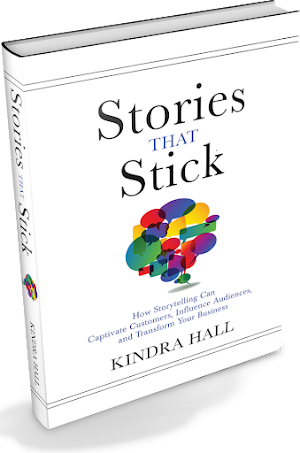Writers, if you’re like me, then you probably love devouring books that can help you navigate the complicated world of publishing. It’s exciting to announce, then, that Technica Editorial is starting a new book review series to share some of the standout books that are well worth sharing.

We’re kicking it off by taking an in-depth look at “Stories that Stick: How Storytelling Can Captivate Customers, Influence Audiences, and Transform Your Business” by Kindra Hall.
Have you ever thought about the impact storytelling can have on your writing and marketing life? In all honesty, I hadn’t either. In fact, I was downright skeptical. As part of a mastermind group, I meet with several other creatives to discuss books that will help us on our respective journeys. When I selected Kindra Hall’s Stories that Stick, the others were dubious about how, exactly, this book was going to help us.
It didn’t take long for us to understand the power of storytelling and that honest and empathic stories create memorable impressions. This is what makes “Stories that Stick” a true stand-out book. Come along with me today on a journey through the fascinating world of storytelling and learn how it can help you connect with readers, agents, and editors.
First things first, let’s talk about Kindra Hall’s writing style. Truly, it’s like sitting down for coffee with a friend who’s bursting with wisdom and fervor. I want her in my life. Hall has this incredible knack for breaking down complex ideas into digestible nuggets of insight, all while keeping you hooked with her own stories and anecdotes. I listened to the audiobook, which she narrates, and her passion for storytelling comes through with every single word she speaks. While there are other books on the power of storytelling, “Stories that Stick” is the creme de la creme in part due to Hall’s unfettered enthusiasm.
Now, onto the juicy stuff—the content. “Stories that Stick” is an absolute treasure trove of practical advice and real-world examples that showcase the power of storytelling. While the focus is storytelling in business, it’s easy to transfer her strategies and tactics to the business of writing, specifically when it comes to marketing. Hall doesn’t just tell you why storytelling matters; she shows you through captivating stories from a diverse range of industries. From big businesses to smaller non-profits and mom-and-pop shops, there’s something here for everyone.
What I love most about this book is its emphasis on authenticity. Hall reminds us that the best stories are the ones that come from the heart—the ones that reflect our values, experiences, and struggles. Let’s be honest. We live in an age of slick marketing campaigns and carefully curated social media feeds. It’s hard to discern what’s performative from something genuine and from the heart. Authenticity becomes a breath of fresh air. It ends up being the thing that sets businesses apart and fosters genuine connections with customers.
While “Stories that Stick” does focus on inspiring and motivating teams (Hall dives into the role of storytelling in leadership, showing how great leaders use stories to rally their troops, instill a sense of purpose, and drive performance), it’s also a powerful reminder that stories inspire, no matter the audience.
In addition, there is a slew of practical tips sprinkled throughout the book…told as…you guessed it, stories. No matter your industry, there are plenty of actionable strategies to elevate your storytelling game. From crafting compelling brand narratives (and remember writer, YOU are your brand) to honing your public speaking skills, Hall tackles it all with humor and wisdom.
What sets “Stories that Stick” apart from other similar books is its combination of emotional appeal, intellectual reasoning, and practical applicability. Hall helps readers recognize the role storytelling has in building connections in both business and personal scenarios. It is not your typical dry, jargon-filled business book; it is truly a vibrant celebration of the art and science of storytelling. Hall’s passion for the subject shines through on every page. As a result, it’s impossible not to get swept up in her enthusiasm. I certainly did.
When you read “Stories that Stick”, you’ll begin to understand how to incorporate the four types of stories Hall shares into your writing life. First is the Value Story, which is all about convincing customers, aka readers (or agents/editors) they need what you write.
Next is the Founder Story. We all have an origin story. Your readers want to know yours. This is the story to include in a sticky post on your website, or in your ‘About’ section.
The Purpose Story is another way to engage with readers. It allows you to show them why you do what you do.
Finally, the Customer Story focuses on your readers and what they experience when they read your work.
To wrap up, “Stories that Stick” is an absolute must-read for writers who want to tap into the power of storytelling in their marketing and as a way to connect with readers on a deeper level. The bottom line? Everyone loves a good story.
~Melissa Bourbon



